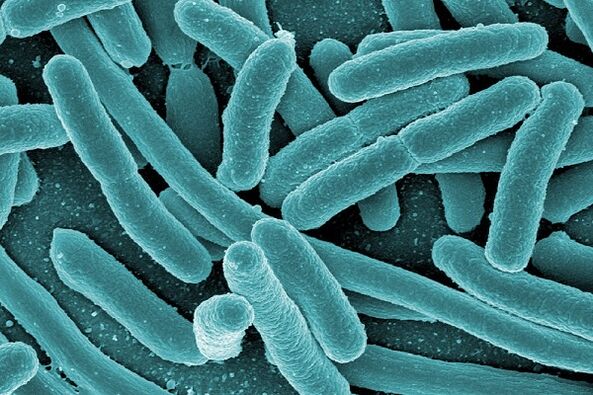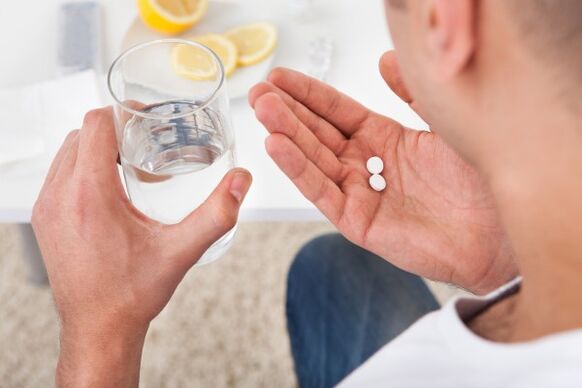In medicine, an infection is understood as the infection of an organ or tissue with various microorganisms, as well as parasites and some insects. Hence, infectious prostatitis is an inflammation in the prostate gland caused by bacteria, viruses or fungi.

The first group of microorganisms becomes the culprit more often. Consider what causes can provoke an infection of the prostate, how the disease will manifest itself and how it can be treated in men.
Causes of Infectious Prostatitis
A healthy man has a defense mechanism against various foreign organisms - the immune system. If this mechanism fails or conditions are created under which infections are stronger than immunity, the prostate tissue becomes infected, which leads to an inflammatory process and unpleasant symptoms.
Infectious prostatitis can be caused by:
- Sex with an infected partner. Even if a woman does not have visible symptoms of sexually transmitted diseases, but there is a pathogen, a man can become infected. As a rule, urethritis begins first, then an infection along the urinary tract enters the prostate and causes prostatitis there.
- The existing focus of infection in the body. The pathogen can be brought into the prostate with the blood flow from other organs in case of pneumonia, flu, caries and other diseases.
- Lifestyle features. Alcohol, nicotine, lack of physical activity weaken the immune system, as a result, bacteria that constantly inhabit the skin and mucous membranes of a person become the culprits of the disease.
- Injuries. When playing sports, fights or an accident, a mechanical effect on the perineum can be exerted, which leads to damage to the tissues of the prostate and can provoke an infectious form of the disease.
- Hypothermia. Due to the low ambient temperature and subsequent freezing, the immune system may not be able to cope with the bacteria that have entered the body.
Infection of the prostate gland is possible with some medical procedures and operations. For example, prostatitis can be triggered by catheterization, which was done in violation of all rules and regulations. In this case, urethritis first develops and only then, as a complication, prostatitis. Also, the disease can be a complication of the biopsy.
Sexually transmitted infections are the most dangerous for the health of men.

Symptoms of the infectious form
Infectious prostatitis always has an acute course, the symptoms appear unexpectedly for the patient, rapidly intensify and cause serious concern. It is impossible to ignore the signs of this disease.
Men come to doctors with the following complaints:
- Sharp, often throbbing pain between anus and eggs. Can "give" to the genitals, lower back or abdomen.
- Increase in body temperature up to 38-39 degrees, fever, chills. The temperature in the rectum can be increased, and in the armpits it can be kept within the normal range.
- Frequent urination and urge to urinate, especially at night.
- Pain when urinating, intermittent stream of urine, burning in the urethra.
- Weakness, nausea, loss of appetite, aching muscles or joints.
- Stool disorder - constipation develops or pain occurs during the act of defecation.
- Decreased sex drive, sluggish erection, painful ejaculation.
If a man is in no hurry to go to the doctor and suffers pain or tries to be treated with antibiotics and folk remedies on his own, pain and urinary disorders can pass after a certain time. The illusion of recovery arises. In fact, the infection has not gone away, and the acute form of prostatitis has developed into a chronic one. This means that from time to time a man will have exacerbations, and also there is a risk of developing infertility.
Infectious prostatitis can result in blood poisoning and the death of the patient, so there is no time to waste trying to cope with the pathology on your own.
Modern diagnostic methods
The clinical picture is so pronounced that the doctor can make the correct diagnosis based on the symptoms listed above. In addition to typical complaints, the anamnesis that is received at the reception is also taken into account - therefore it is important to contact a medical institution in a timely manner.
To select the correct treatment tactics, it is important to understand more precisely what is happening in the body and what pathogen is causing the pathology. Therefore, there is a certain amount of examination required for this case.
During the appointment, the doctor will carry out the following activities:
- It will measure the body temperature in the anus and in the armpit (with infectious acute prostatitis, there will be a difference in readings up to 0. 5 ° C).
- Check the condition of the lymph nodes in the pelvic region.
- Palpate the lower abdomen, perineum, lower back.
Prostate massage with this form of the disease is not performed due to pronounced pain. Also, such a manipulation can provoke the transmission of infection from the gland to other organs and systems, with a subsequent likely death. Even the suspicion of infectious prostatitis is a contraindication for such procedures.
Laboratory tests of blood, urine, bacterial cultures are important. With their help, you can determine the type of pathogen and confirm inflammation.

From instrumental methods, TRUS, CT, MRI, uroflowmetry (to determine the rate of urine outflow) and other methods can be used, at the discretion of the attending physician. Most often, transrectal ultrasound examination in combination with laboratory methods and data from anamnesis is sufficient. CT or MRI is performed if a tumor is suspected or in doubtful cases.
Modern principles of treatment
If there are no pronounced signs of intoxication of the body, treatment is permissible at home. Otherwise, hospitalization, intravenous infusions of antibacterial agents and increased monitoring by medical personnel will be required. In both cases, the sick man needs bed rest - even a slight physical activity can provoke the spread of the infection through the body by the blood stream.
Treatment of patients is aimed at achieving two goals: combating pathogenic microflora and improving general well-being. As a whole, movement in this direction is designed to prevent death or the development of complications.
Fighting infection
If in the course of laboratory tests it is established that infectious prostatitis is caused by bacteria (which happens most often), the use of antibacterial agents should become the basis of therapy. If just such a treatment is started, then an improvement in well-being will come after 2-3 days. However, for this, the drug must be selected correctly. The duration of taking the drug is also important - it can go up to a month, depending on the specific drug and the degree of prostate damage. Treatment cannot be interrupted.
In addition to the type of pathogen, the doctor must take into account some other factors.
- Individual characteristics of the patient, the state of the heart, liver and kidneys.
- If possible, make a choice in favor of a stronger drug, overshadowing such bacteriostatic agents.
- The effect of therapy with antibacterial drugs should be bactericidal, that is, aimed at destroying the pathogen, and not at stopping its development in the tissues of the prostate gland.
It is for these reasons that infectious prostatitis cannot be treated on its own. Without a medical education and not possessing the skills of interpreting diagnostic measures, it is almost impossible to choose the right antibacterial substance. Delay, like the wrong treatment in this case, can cost life.

Symptomatic treatment
The intensity of pain in infectious prostatitis is such that standard pain relievers and antispasmodics may be useless. In such exceptional cases, to relieve pain, the doctor may prescribe narcotic drugs in a short course.
Can also be assigned:
- Diuretics (if there is no acute urinary retention) for the prevention of cystitis.
- Laxatives (if constipated) to relieve pressure on the prostate gland.
- Non-steroidal anti-inflammatory drugs.
- Alpha-blockers - to normalize the urination process.
- Muscle relaxants to relieve spasm of the pelvic floor muscles.
If an acute urinary retention has begun during infectious prostatitis, a urinary catheter may be placed in the patient.
If during therapy it becomes obvious that the patient's well-being is not improving, this is a reason to do additional TRUS to exclude a possible prostate abscess. In doubtful cases, a biopsy of the prostate tissue can also be done. If the diagnosis is confirmed, the sick man undergoes an emergency operation to open and drain the abscess. Antibiotic therapy will not be canceled.
Danger of infectious prostatitis
If a man consulted a doctor in a timely manner and did not violate his prescriptions, recovery almost always occurs. In some variants of the development of events, a transition to a chronic form or the occurrence of chronic pelvic pain syndrome (CPPS) is possible.
Other likely consequences:
- pyelonephritis or cystitis;
- blood poisoning;
- the formation of fistulas.
Infectious prostatitis responds well to treatment if it is started in a timely manner. For this, a man must listen to the state of his health. If pain begins in the perineal region with a simultaneous increase in body temperature in the anus and impaired urination, you should immediately consult a doctor. Using folk remedies and following the advice of a friend or wife can end in disaster.























